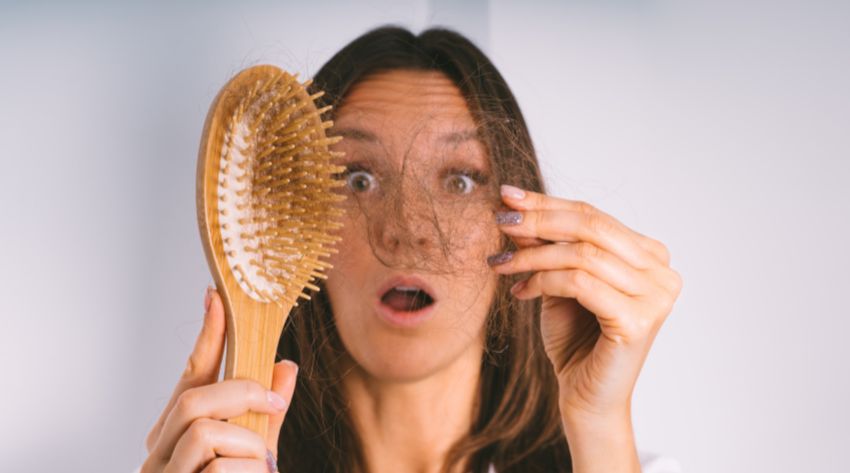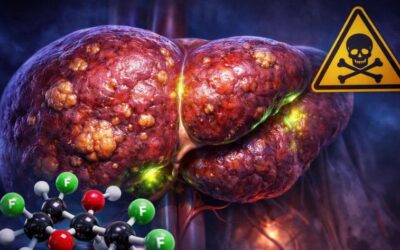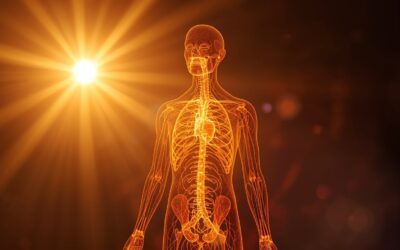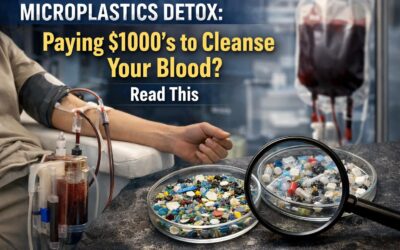Hair loss is rarely just about your hair—it’s often a sign of something deeper, like hormonal shifts, missing nutrients, or toxin overload. In this article, we uncover the hidden root causes and highlight the most effective supplements to help restore healthy, vibrant hair growth from the inside out.
Not only is hair loss embarrassing for men, it is also frustrating and deeply concerning for women. It is something I personally have experienced, and the issue has definitely affected my self esteem and confidence. I experienced hair loss in my twenties when it wasn’t as common, but nowadays, hair loss has become more and more prevalent due to increased issues surrounding toxins, hormonal imbalances and thyroid issues.
People become so distraught that they will spend thousands on serums, topical creams, shampoos and more just in hopes for some hair regrowth. The truth is that healthy, strong hair growth begins internally. The health of your hair is directly linked to thyroid function, protein availability, detoxification efficiency, and overall nutrient absorption. If any of these key factors are missing, hair becomes thin, weak, slow-growing, and prone to excessive shedding.
Understanding the Root Cause of Hair Loss
Hair loss often starts beneath the surface—hormones, stress, toxins, and nutrient deficiencies can silently disrupt healthy hair growth cycles.
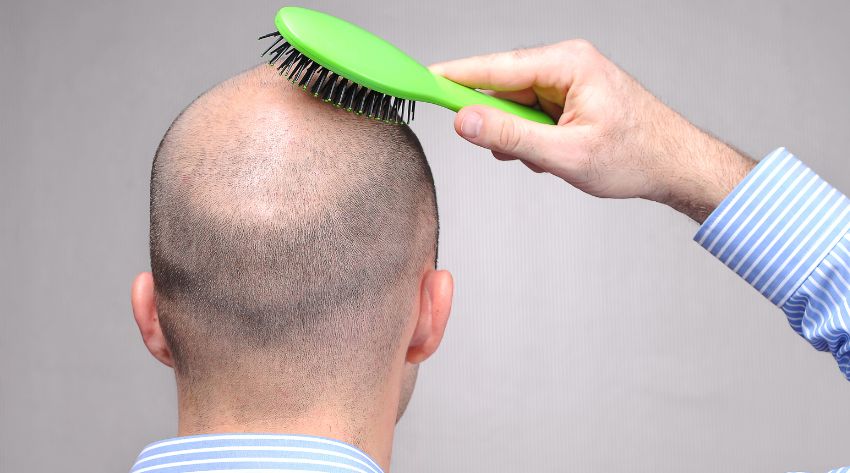
Hair loss is usually seen as a vanity issue, but in reality, it is a reflection of a deeper root cause in the body. When the body is under some sort of “stress,” it shuts off the functions that don’t help with survival and directs all of its energy to the more important organs like liver, gut, kidneys and brain; you don’t need hair to survive. Hair growth is directly affected by thyroid function, hormone balance, nutrient availability, detoxification capacity, and the presence of environmental toxins- all things that can cause “stress” to the body.
In today’s world, more people than ever are experiencing chronic inflammation and disease which in turn has many side effects including hair loss; this is due to nutrient deficiencies, heavy metal toxicity, endocrine disruptors, inflammatory foods, and even exposure to synthetic toxins like spike protein. Therefore, to correct and reverse hair loss, you need to address the underlying issue, not just use a topical “magic” serum.
Below are the most common triggers for hair loss today:
Specific Hair Loss Triggers
Did you know that the root cause of hair loss can be different for different people? Following I outline the top eight root causes of hair loss, including symptoms and supplements you can use to target each specific root cause.
Let me also add that while you will find specific supplements to target the root cause of your hair loss, the number 1 supplement I recommend for anyone experience hair loss, shedding, bald patches or thinning is Acceleradine® Iodine.
Let’s first look at iodine deficiency related hair loss and learn more about iodine.
1. Iodine Deficiency and Hair Loss
Iodine is the most imperative mineral for not only hair growth, but thyroid optimization, energy, cognition, immunity, hormonal balance and more.
96 percent of the United States is Iodine Deficient.
Without enough iodine, the thyroid gland fails to produce adequate levels of thyroid hormones (T3 and T4- the 3 and 4 stand for 3 and 4 molecules of iodine), which are essential for hair growth, strength, and scalp circulation.
To make things worse, chemicals like fluoride, chlorine, and bromide—found in tap water, processed foods, and pollution—can push out the little iodine your body does have. These chemicals take the place of iodine in your cells, making it harder for your body to absorb what it needs. This can slow down your thyroid and lead to even more hair loss.
Signs Iodine Deficiency Could be the Root Cause of Your Hair Loss
- Slow hair follicle turnover – Low thyroid hormones keep hair follicles from regenerating effectively, causing excessive shedding of the hair.
- Brittle, weak hair strands – Iodine deficiency decreases keratin production, making hair breakage more prevalent.
- Scalp dryness and irritation – Without enough iodine, the scalp becomes inflamed, dry, and flaky.
- Loss of pigmentation – A lack of iodine can lead to premature graying.
- Loss of eyebrow hair – a telltale sign of iodine deficiency related hair loss is loss of eyebrow hair.
- Bald spots – with iodine deficiency related hair loss, it’s likely you will have patchy bald spots in combination with the above symptoms.
The Supplement to Address Iodine Deficiency Related Hair Loss
Acceleradine® Iodine helps restore essential iodine levels, supporting thyroid function and revitalizing hair growth from the inside out naturally.
Acceleradine® Iodine stands apart because it delivers the purest, most bioavailable form of iodine—monatomic, scalar-charged, and free from toxins, alcohol, and fillers. Unlike kelp-based or glycerin formulas, it’s organically and ethically sourced and helps flush out harmful halogens like fluoride and chlorine that block iodine absorption. By restoring optimal thyroid function, Acceleradine supports healthy hair growth, scalp circulation, and overall vitality—offering unmatched purity and effectiveness in one powerful formula.
2. Endocrine Disruptors and Hair Loss
The endocrine system is controlled by the thyroid and regulates hormones, stress, adrenals, excess estrogen, testosterone levels and even insulin. All of these factors affect hair growth individually.
They play a direct role in hair follicle activity, scalp health, and shedding cycles. Unfortunately, endocrine disruptors from plastics, pesticides, food preservatives, and chemical-laden personal care products in our modern day environment interfere with hormone balance.
Common Endocrine Disruptors That Impact Hair Loss
- Plastics (BPA, phthalates) – These mimic estrogen, leading to estrogen dominance that triggers hair thinning.
- Pesticides and herbicides (glyphosate) – These slow down thyroid hormone production, increasing hair loss risk.
- Fluoride and chlorine – These halogens block iodine uptake, slowing down hair growth.
- Synthetic fragrances and parabens – These act as xenoestrogens, increasing estrogen dominance, again causing hair loss.
Signs You Are Experiencing Endocrine Disrupted Hair Loss
Thinning hair or bald patches despite no changes in hair care routine
Irregular or absent menstrual cycles, pointing to hormone imbalance (especially estrogen, progesterone, or thyroid)
Unexplained weight changes (gain or loss), often linked to thyroid dysfunction
Chronic fatigue or low energy, a common sign of adrenal or thyroid imbalance
Dry, brittle hair or slowed hair growth, associated with low thyroid hormone levels (hypothyroidism)
Supplement to Combat Endocrine Disruptors and Support Healthy Hair Growth
Accelerated Thyroid® helps counter the effects of endocrine disruption by supporting hormone balance, boosting energy, and promoting healthy hair growth.
Hair health depends on a healthy thyroid. Even small hormonal imbalances can quietly undermine hair growth. Accelerated Thyroid® is a 3-in-1 full spectrum formula blend of thyroid glandular extract, and adaptogenic herbs—all chosen to help the thyroid and adrenal systems function their best.
Learn more about Accelerated Thyroid®.
3. Spike Protein Exposure and Hair Loss
Emerging research points to spike protein exposure, whether from illness or environmental shedding, may contribute to increased hair loss. The spike protein can increase inflammation, oxidative stress, and vascular damage, all of which impact scalp circulation and hair follicle health.
How the Spike Protein May Contribute to Hair Loss
- Increased inflammation – This can damage hair follicles and make it difficult for normal hair growth to occur.
- Microvascular damage – This reduces circulation to the scalp, depriving hair follicles of oxygen and nutrients.
- Autoimmune activation – This can trigger conditions like alopecia areata, where the immune system attacks hair follicles.
Many people who have experienced hair loss post-illness or vaccination may experience an exaggerated inflammatory response that inhibits healthy hair growth cycles.
Signs you Could be Experiencing Spike Protein Related Hair Loss
Here are five potential symptoms of spike protein-related hair loss, which may occur following viral infection or exposure to spike protein through other means:
- Sudden or rapid hair shedding (telogen effluvium) – Hair falls out in clumps, often triggered by systemic stress or inflammation caused by spike proteins.
- Diffuse thinning across the scalp –Unlike pattern baldness, the thinning is widespread and not localized to a specific area.
- Dry, brittle, or thinning hair shafts –Inflammatory effects on the follicles can impact hair quality and texture.
- Scalp sensitivity or inflammation –Pain, tingling, or tenderness in the scalp may occur due to immune activation around hair follicles.
- Slowed regrowth or miniaturized new hair – Post-shedding, new hair may grow in weaker or thinner due to damage to the follicle cycle.
The #1 Supplement to Help Combat Spike Protein Related Hair Loss (or any other Spike Protein health issues)
Iodine is one of the most powerful tools in combating the harmful effects of spike protein in the body. As a vital nutrient for immune function, thyroid health, and cellular detoxification, iodine helps the body neutralize and eliminate toxic proteins—including the spike protein—by supporting metabolic efficiency and mitochondrial resilience.
Acceleradine® Iodine is a powerful, monatomic form of iodine designed to deeply detox your cells and reignite sluggish thyroid function, two key factors in reversing hair loss caused by spike protein exposure. What sets it apart? It’s scalar-charged and 100% chemical-free, giving it the ability to penetrate cells deeply, flush out harmful halogens like chlorine and fluoride, and jumpstart thyroid hormone production. These hormones are essential for keeping hair in its active growth phase.
By reawakening dormant follicles, boosting scalp circulation, and supporting mitochondrial energy, Acceleradine® helps your body shift from hair loss mode into full-on regeneration—restoring thicker, healthier, more vibrant hair from the inside out.
4. Oxalates and Hair Loss
Oxalates are naturally occurring compounds found in certain plant foods that can bind to minerals and prevent their absorption. Oxalates are usually associated with kidney stones; however, high oxalate intake can also contribute to hair loss by not only blocking the absorption of zinc, calcium, and magnesium—three essential minerals for hair follicle health, but also slowing down thyroid function and causing hypothyroidism hair loss.
Oxalate-Rich Foods That May Contribute to Hair Loss
- Spinach, beets, sweet potatoes, almonds, and dark chocolate – High oxalate content may contribute to mineral deficiencies.
- Turmeric and certain herbal supplements – Often touted as detoxifiers and anti-inflammatories, these may block nutrient absorption.
How Oxalates Harm Hair Growth:
- Reduced absorption of zinc, calcium, and magnesium – Leading to weak hair strands and poor follicle support.
- Increased inflammation – Triggering oxidative stress in hair follicles.
- Slowed thyroid function – Blocking the uptake of iodine, worsening thyroid-related hair loss.
For those with hair loss, reducing high-oxalate foods and opening detoxification pathways can be helpful in restoring hair health.
Signs Oxalates May Be the Root Cause of Your Hair Loss
Here are five signs oxalates may be the hidden culprit behind your hair loss:
- Persistent Shedding Despite Healthy Habits -You’re eating clean, taking supplements, and balancing hormones—yet your hair keeps falling out. Oxalate buildup may be blocking nutrient absorption and triggering inflammation at the follicle level.
- Scalp Pain or Tenderness – A burning, tingling, or sore scalp could indicate oxalate crystals irritating nerve endings and tissues beneath the skin—disrupting healthy hair growth.
- Unexplained Nutrient Deficiencies – Low levels of minerals like zinc, magnesium, and biotin—despite a good diet—can suggest oxalates are binding to these nutrients and preventing them from being properly used by the body.
- A History of Kidney Stones or Gut Issues -Frequent kidney stones, IBS, or a sensitive digestive system are classic red flags of oxalate overload. These conditions often go hand-in-hand with systemic symptoms, including hair loss.
- Worsening Symptoms After Eating “Healthy” Foods - Spinach, almonds, sweet potatoes, and beets are all high-oxalate “superfoods.” If your hair loss worsens after eating clean, oxalates could be the reason your healthy diet is backfiring.
To Eliminate Oxalate Related Hair Loss, You Need a Detox
The Accelerated Diet Detox Program is a 30 day full spectrum detox cleanse specifically designed to gently detox the body while restoring metabolic function, making it highly effective at reducing oxalate buildup.
By supporting the liver, kidneys, and gut with targeted nutrients and eliminating high-oxalate foods, this cleanse helps flush out harmful oxalate crystals, improve nutrient absorption, and relieve inflammation—key steps in reversing oxalate-related symptoms like fatigue, pain, and even hair loss.
5. Sulfur Foods and Hair Loss
While sulfur is essential for hair growth because it is a key component of keratin, many people today are unable to process sulfur efficiently due to high glyphosate exposure.
Glyphosate (the active ingredient in herbicides like Roundup) disrupts sulfur metabolism, leading to:
- Inhibited ability to process sulfur-based amino acids like methionine – A crucial building block for keratin.
- Accumulation of toxic sulfur compounds – This can lead to oxidative stress and hair thinning.
- Increased burden on the liver – Impaired liver detoxification can trigger hormonal imbalances and slow thyroid function, both of which affect hair health.
Because it is almost impossible to avoid glyphosate exposure entirely, it may be best to avoid or limit sulfur containing foods and medications.
High sulfur foods include broccoli, cauliflower, kale, onions, garlic; supplements include glutathione, NAC, and MSM. It is imperative to support liver health as well for detoxification of these compounds.
Signs You May Be Experiencing Sulfur Related Hair Loss
Here are five signs you may be experiencing sulfur-related hair loss:
- Strong Odor from Sweat or Urine –
A persistent “rotten egg” or sulfur-like smell can indicate sulfur metabolism issues or buildup in the body. - Itchy, Flaky Scalp with No Clear Cause- An inflamed or irritated scalp may result from poor sulfur detox pathways, often linked to impaired methylation or sulfur overload.
- Hair That’s Brittle, Dry, or Breaking Easily –
Sulfur is essential for keratin production. A deficiency—or poor sulfur processing—can lead to weak, fragile strands that break off instead of growing. - Headaches or Brain Fog After Eating Sulfur-Rich Foods – Feeling worse after eating garlic, onions, eggs, or cruciferous vegetables could mean your body struggles to process sulfur, triggering systemic symptoms—including hair loss.
- Known CBS Gene Mutation or Methylation Issues – Genetic variants affecting sulfur pathways, like CBS mutations, can cause sulfur buildup and block detoxification—contributing to inflammation and hair thinning.
- Strong Odor from Sweat or Urine –
My Go-To Detox for Eliminating Sulfur and Supporting Hair Regrowth
Once again, I recommend the Accelerated Diet Detox Program. The ‘Diet’ doesn’t just refer to weight loss, it’s the perfect detox to eliminate nasty toxins, sulfates and build up from unhealthy diets and foods.
6. Heavy Metals and Hair Loss
Heavy metal exposure is one of the hidden causes of hair thinning and scalp inflammation. Lead, mercury, aluminum, and cadmium accumulate in the thyroid, liver, and bloodstream, blocking detoxification pathways and disrupting hormone balance.
How Heavy Metals Contribute to Hair Loss
- Blocks iodine absorption – Leads to hypothyroid-related hair thinning.
- Increases oxidative stress – Damages hair follicles, leading to premature shedding.
- Increases inflammation – Can cause scalp irritation, dandruff, and slow regrowth.
Hidden Sources of Heavy Metal Exposure
- Tap water (fluoride, chlorine, lead)
- Seafood (mercury in fish like tuna and swordfish and radiation from Fukushima)
- Cosmetics and personal care products (aluminum-based deodorants, lead in lipstick)
- Vaccines and medications (aluminum and mercury-based preservatives)
Supporting heavy metal detoxification can be a crucial step in restoring healthy hair growth and scalp circulation.
Signs of Heavy Metal Related Hair Loss
- Your Hair’s Falling Out Fast—And You Don’t Know Why – When hair starts shedding rapidly and hormone tests or diet tweaks aren’t helping, hidden heavy metals like mercury or arsenic may be to blame—silently disrupting your follicles.
- You’re Tired, Foggy, or Moody for No Reason – Feeling constantly drained, mentally sluggish, or emotionally off-kilter? These are common red flags of heavy metal toxicity—and hair thinning often follows.
- You’re Low in Key Minerals Despite a Healthy Diet – Even with a clean diet and supplements, your body might be starved of zinc, selenium, and magnesium—vital nutrients hijacked by toxic metals.
- You Notice a Metallic Taste or Strange Body Odor – A sour or metallic taste in your mouth, bad breath, or odd body odor could be your body’s way of revealing a hidden toxic overload.
- You’ve Had Fillings, Vaccines, or Toxic Exposure – Old dental amalgams, vaccines, or time spent in polluted environments may have left behind a heavy metal burden that slowly disrupts your hair health from the inside out.
What to Take if you Suspect Heavy Metal Related Hair Loss
There is only one protocol I recommend if you suspect heavy metal related hair loss – the Accelerated Radiation & Heavy Metal Detox Kit.
The Accelerated Radiation & Heavy Metal Detox Kit is your secret weapon. It’s formulated to flush out hidden toxins like mercury, lead, and cadmium—metals that quietly sabotage your follicles. By clearing heavy metals, supporting deep cellular detox, and restoring your body’s mineral balance, this powerful kit helps reignite healthy, vibrant hair growth from the inside out.
7. Low Protein Intake and Hair Loss
Hair is primarily made of keratin, a protein that requires amino acids to form strong, healthy strands. One of the first signs of low protein consumption is hair loss. If the body is lacking high-quality protein from animal sources, hair strands are the first to suffer becoming thin, weak, and prone to breakage.
How Protein Deficiency Contributes to Hair Loss
- Reduces keratin production, leading to weaker, brittle hair.
- Slows down hair regrowth, prolonging the resting phase of the hair cycle.
- Weakens scalp tissue, making follicles more susceptible to damage.
Ensuring an adequate intake of bioavailable protein from sources like grass-fed wild meat, eggs, and essential amino acids is key for maintaining strong, resilient hair growth.
Signs Low Protein Intake Could Be the Root Cause of Your Hair Loss
- Hair Feels Thin, Weak, or Breaks Easily -Without enough protein, your body can’t produce strong keratin—the key building block of healthy hair.
- Slower Hair Growth or Longer Gaps Between Haircuts – If you’ve noticed your hair isn’t growing as fast as it used to, it could be due to inadequate amino acids needed for new strand formation.
- Increased Hair Shedding During Brushing or Showering – Excessive daily shedding may signal your body is prioritizing essential functions over hair maintenance due to protein deficiency.
- Brittle Nails and Weak Muscles Alongside Hair Loss -Thinning hair paired with weak nails or poor muscle tone may point to overall low protein intake.
- You’re Following a Plant-Based, Low-Calorie, or Restrictive Diet - Diets lacking complete proteins can lead to nutrient shortfalls that silently affect hair health over time.
You're Number 1 Supplement to Increase Protein Intake
Amino acids are the building blocks of protein—and your hair is made almost entirely of a protein called keratin. When your body isn’t getting enough quality protein, it struggles to maintain healthy hair growth. Supplementing with a complete amino acid formula gives your body the raw materials it needs to repair, strengthen, and regrow hair—making it the most effective solution for hair loss linked to low protein intake.
Accelerated AMINOS® is the perfect solution for boosting your protein intake without the hidden downsides of sugars, preservatives, or fillers. Unlike typical protein powders or bars that often contain additives that can disrupt digestion or hormone balance,
Accelerated AMINOS® delivers pure, essential amino acids in the exact ratios your body needs to support muscle repair, collagen production, and hair follicle regeneration.
Because it’s rapidly absorbed and utilized by the body—without the need for digestion—it helps combat hair loss caused by low protein intake more effectively, nourishing your hair from the inside out and supporting optimal cellular and metabolic function.
8. Copper Deficiency and Hair Loss
Copper is a forgotten mineral that is necessary for hundreds of mechanisms in the body, including hair growth, hair color, and hair circulation. It plays a key role in the production of melanin, the pigment responsible for hair color, and helps the formation of collagen and elastin, which help maintain the structure of hair follicles.
Copper is also essential for iron absorption and alleviating anemia, and without sufficient copper, usable iron levels may drop, leading to anemia-related hair loss.
Additionally, copper is involved in the function of enzymes that promote blood vessel formation, ensuring that hair follicles receive adequate oxygen and nutrients for healthy growth.
Signs You May Be Experiencing Copper Related Hair Loss
- Thinning hair at the crown – or receding hairline despite adequate iron or protein intake
- Brittle, weak strands that break easily or lack luster
- Slow hair regrowth even after addressing other nutrient deficiencies
- Unexplained low iron or ferritin levels, as copper is essential for proper iron absorption
- Premature greying or changes in hair pigmentation due to impaired melanin production
Your Solution to Copper Related Hair Loss
Modern diets are often low in bioavailable copper, especially with the rise of processed foods and copper-depleted soil. Even healthy diets may fall short of the levels needed to support hair growth, collagen production, and iron metabolism.
To effectively restore copper levels and address copper-related hair loss, supplementation is often necessary—providing a more concentrated, absorbable form to help revive dormant follicles and promote stronger, healthier hair.
Accelerated Scalar Copper® is a powerful liquid copper supplement designed to rapidly replenish bioavailable copper levels, helping to reverse hair loss linked to copper deficiency. Its unique scalar-charged formula enhances absorption and cellular utilization, making it far more effective than standard copper supplements.
By supporting collagen and elastin production, improving iron metabolism, and reactivating melanin for natural hair color, Accelerated Scalar Copper® helps strengthen hair follicles, reduce shedding, and encourage new, healthy growth—especially in those struggling with brittle strands, thinning at the crown, or premature greying.
Next Steps to Reversing Hair Loss
Hair loss is rarely just a surface-level issue; it is a symptom of a deeper root cause.
Review each of the causes above to determine which symptoms you align with and introduce that supplement into your diet.
For a comprehensive personal, custom supplement protocol, complete a Supplement Protocol Request Form.
Iodine and copper deficiency, endocrine disruptors, toxic exposures, poor protein intake, and hormonal imbalances all play a role in the health and vitality of hair follicles. By addressing these root causes, it is possible to restore strong, healthy hair naturally.
Let’s help that hair grow back together!
Sara Banta
Sara Banta is a Stanford University Graduate with a Degree in Economics and Psychology, and a certified Natural Supplement Expert & Graduate of the Institute for Integrative Nutrition. Sara is the Founder of Accelerated Health Products and host of the health & wellness podcast, Accelerated Health Radio.
- Sara Banta
- Sara Banta
- Sara Banta
- Sara Banta
- Sara Banta
- Sara Banta
- Sara Banta
- Sara Banta
- Sara Banta
- Sara Banta
- Sara Banta
- Sara Banta
- Sara Banta
- Sara Banta
- Sara Banta
- Sara Banta
- Sara Banta
- Sara Banta
- Sara Banta
- Sara Banta
- Sara Banta
- Sara Banta
- Sara Banta
- Sara Banta
- Sara Banta
- Sara Banta
- Sara Banta
- Sara Banta
- Sara Banta
- Sara Banta
- Sara Banta
- Sara Banta
- Sara Banta
- Sara Banta
- Sara Banta
- Sara Banta
- Sara Banta
- Sara Banta
- Sara Banta
- Sara Banta
- Sara Banta
- Sara Banta
- Sara Banta
- Sara Banta
- Sara Banta
- Sara Banta
- Sara Banta
- Sara Banta
- Sara Banta
- Sara Banta
- Sara Banta
- Sara Banta
- Sara Banta
- Sara Banta
- Sara Banta
- Sara Banta
- Sara Banta
- Sara Banta
- Sara Banta
- Sara Banta
- Sara Banta
- Sara Banta
- Sara Banta
- Sara Banta
- Sara Banta
- Sara Banta
- Sara Banta
- Sara Banta
- Sara Banta
- Sara Banta
- Sara Banta
- Sara Banta
- Sara Banta
- Sara Banta
- Sara Banta
- Sara Banta
- Sara Banta
- Sara Banta
- Sara Banta
- Sara Banta
- Sara Banta
- Sara Banta
- Sara Banta
- Sara Banta
- Sara Banta
- Sara Banta
- Sara Banta
- Sara Banta
- Sara Banta
- Sara Banta
- Sara Banta
- Sara Banta
- Sara Banta
- Sara Banta
- Sara Banta
- Sara Banta
- Sara Banta
- Sara Banta
- Sara Banta
- Sara Banta
- Sara Banta
- Sara Banta
- Sara Banta
- Sara Banta
- Sara Banta
- Sara Banta
- Sara Banta
- Sara Banta
- Sara Banta
- Sara Banta
- Sara Banta
- Sara Banta
- Sara Banta
- Sara Banta
- Sara Banta
- Sara Banta
- Sara Banta
- Sara Banta
- Sara Banta
- Sara Banta
- Sara Banta
- Sara Banta
- Sara Banta
- Sara Banta
- Sara Banta
- Sara Banta
- Sara Banta
- Sara Banta
- Sara Banta
- Sara Banta
- Sara Banta
- Sara Banta
- Sara Banta
- Sara Banta
- Sara Banta
- Sara Banta
- Sara Banta
- Sara Banta
- Sara Banta
- Sara Banta
- Sara Banta
- Sara Banta
- Sara Banta
- Sara Banta
- Sara Banta
- Sara Banta
- Sara Banta
- Sara Banta
- Sara Banta
- Sara Banta
- Sara Banta
- Sara Banta
- Sara Banta
- Sara Banta
- Sara Banta
- Sara Banta
- Sara Banta
- Sara Banta
- Sara Banta
- Sara Banta
- Sara Banta
- Sara Banta
- Sara Banta
- Sara Banta
- Sara Banta
- Sara Banta
- Sara Banta
- Sara Banta
- Sara Banta
- Sara Banta
- Sara Banta
- Sara Banta
- Sara Banta
- Sara Banta
- Sara Banta
- Sara Banta
- Sara Banta
- Sara Banta
- Sara Banta
- Sara Banta
- Sara Banta
- Sara Banta
- Sara Banta
- Sara Banta
- Sara Banta
- Sara Banta
- Sara Banta
- Sara Banta
- Sara Banta
- Sara Banta
- Sara Banta
- Sara Banta
- Sara Banta
- Sara Banta
- Sara Banta
- Sara Banta
- Sara Banta
- Sara Banta
- Sara Banta
- Sara Banta
- Sara Banta
- Sara Banta
- Sara Banta
- Sara Banta
- Sara Banta
- Sara Banta
- Sara Banta
- Sara Banta
- Sara Banta
- Sara Banta
- Sara Banta
- Sara Banta
- Sara Banta
- Sara Banta
- Sara Banta
- Sara Banta
- Sara Banta
- Sara Banta
- Sara Banta

